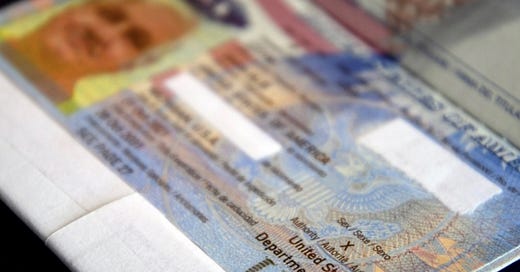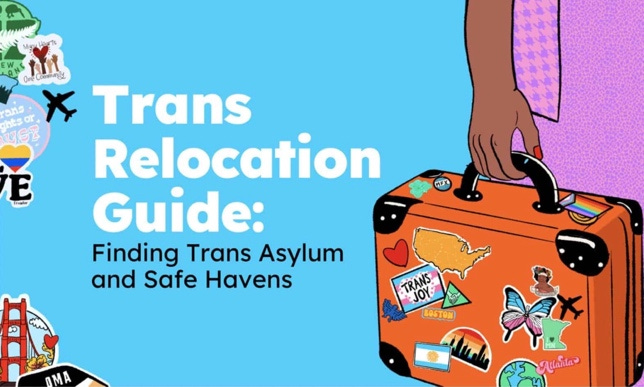What can you do to protect yourself while traveling as a transgender or nonbinary person? (Pt. 7 of an 8-part series)
An update on how Trump’s policies impact travel for transgender and nonbinary people, with tips on safer traveling and steps to take.
The Trump administration has eliminated gender-neutral (X marker) passports, one of a rash of anti-trans attacks that are reversing rights for trans and nonbinary individuals, and making travel harder and less safe for them.
(Part 7 of an 8-part series)
In this newsletter:
How are Trump’s policies impacting on travel for transgender and nonbinary individuals?
Can I travel with my X marker passport? Will I be able to get back into the country? Is there a risk in leaving? Can I renew my passport? The new rules.
New orders that impact transgender athletes — and may implicate all transgender visitors and visa applicants to the US
Anecdotal harassment reports
What to expect now
Other IDs. What about my driver’s license or birth certificate?
General advice for all travelers
The legal push-back. Resources to help you.
Traveling while trans or nonbinary
Get your travel documents in order now
Trans relocation
How are Trump’s policies impacting on travel for transgender and nonbinary individuals?
An estimated 1.3 million adults in the US identify as transgender or nonbinary in the US, and that number has been climbing over the years with increased public awareness and acceptance of trans identity and rights. There are also more children and young adults who self-identify as nonbinary or trans and come out to their parents and families and in school. The issue of young trans identity, and the demand for emotional support, mental health services, and gender-affirming care for these children and young adults, has also led to demonization of transgender identity and served as a political weapon by right-wing groups to divide society.
The Trump administration has gone further, moving to erase trans and nonbinary identity, and criminalize trans health care. Trump has issued a number of anti-trans Executive Orders, including one that declares that the government will only recognize two sexes, male and female — a de facto erasure of transgender and nonbinary identity or any notion of gender as fluid and a social construction. These policies mirror proposals put forth in Project 2025, the radical right blueprint for remaking our federal government and aligning laws and policies with a “pro-life,” anti-LGBTQ+, anti-diversity, anti-feminist agenda.
If you’re transgender or identify as nonbinary: you already likely know that Trump’s administration and Project 2025 have moved to criminalize gender identity and strike gender markers from federal agencies, policies – and identity documents. As of February 2025, the US State Department will no longer issue passports with an X marker, only passports with an M or F sex marker that matches the applicant’s biological sex assigned at birth.
Can I travel with my X marker passport? Will I be able to get back into the country? Is there a risk in leaving? Can I renew my passport?
The new rules:
If you already have a passport with an X marker, you can travel with it until its date of expiration, under International Civil Aviation Organization (ICAO) policy, per Lambda Legal, but that is not a guarantee that federal agents at airports or border control agents will honor this policy. But, as of February 26, Lambda writes that it has NOT received or been made aware of ANY confirmed reports of trans and nonbinary individuals having trouble leaving or returning to the US – which is reassuring for the moment.
New orders that impact transgender athletes — and may implicate all transgender visitors and visa applicants to the US:
On Feb. 24, Trump Secretary of State Marco Rubio directed the State Dept. to deny visas to transgender athletes if they has X markers on their passports (if their sex marker did not align with their sex assigned at birth). The State Dept. order follows a Trump Executive Order 14201, Keeping Men Out of Women’s Sports, that reinterprets Title IX policy. The new order allows consular officers to deny visas to applicants based on “reasonable suspicion” of a transgender identity if, a: their passport lists a gender marker different from their sex assigned at birth or; b: “other evidence casts reasonable doubt on the applicant’s sex.”
That’s mighty vague, and language that can easily be weaponized, isn’t it? Will consular officers be able to reject a visa applicant based on a perception of gender based on dress or behavior? The fallout is likely to impact not only individual athletes and their teams and families and the institutions they represent, but university and sports programs and departments who have recruited or hope to recruit promising athletes. It also goes much further, implicating all transgender individuals applying for US visas, including students, researchers, and faculty, according to an analysis by SeyFarth.
The order is viewed as a violation of Title IX policies, and may violate athletic and other policies of universities and other institutions, too. LGBTQ+, civil rights, educational and legal groups are expected to mount a legal challenge to the order.
Anecdotal harassment reports:
There have been anecdotal complaints shared on social media by trans passport applicants in the wake of the new passport ruling. Some trans travelers report fresh anti-trans hostility to applicants seeking to renew their passports. There was a fast, global LGBTQ+ community outcry at the rejection of renewal of passports with X markers. On social media, one trans individual on Facebook posted pictures showing their rejected passport with an X marker being returned by mail vandalized — damaged and torn up, while supporting documents were blacked out with a marker — a hostile erasure attack. Such actions reflect increased anti-trans hostility and attacks being made online and by some Trump GOP officials and MAGA supporters who feel emboldened to engage in hate speech and homophobic attacks given the Trump administration’s demonizing of trans and nonbinary identity and broadly, gender identity.
What to expect now:
If you apply to renew an existing X marker passport, you may see your application set aside or delayed, some activists contend. Per the new rules, you will be issued a passport with a different marker – M or F – forcibly matching your biological sex assigned at birth. This is a discriminatory policy, but it is the law – for now, and will be challenged.
Other IDs: What about my Driver’s License or Birth Certificate?
What happens if you have a Driver’s License with an X marker? It may flag you as trans or nonbinary, but the license is legal. According to Lambda Legal, State-issued forms of identification, including driver’s licenses and birth certificates, are not affected by the Executive Order on passports. But note, the Trump administration has directed the Social Security Administration to stop processing gender marker updates of Social Security records. So if you applied for a general marker change to X, your request will likely be rejected by Social Security, per Lambda. It provides a Q and A updated guidance on Identity Documents for Trans, Nonbinary, Gender-Noncomforming and Intersex People that address common questions being asked about the new passport rules and traveling with other IDs.
General advice for all travelers:
If you don’t have a passport, it’s recommended you apply for one now, because more delays, not fewer, are likely, given cuts to the federal workforce that are slated to impact all the federal agencies.
Check your passport now if you have one to see when it may expire, and make sure yours is current. The Passport offices are likely to be impacted by the mass federal workforce layoffs that are underway, and any cuts could spell future delays in processing passport applications. Your passport name should always match the name on your airline ticket, too. It’s always important to have a paper copy of your passport, and consider an online scan stored safely on a USB drive or encrypted digital space. That way, you can feel calmer, knowing you are proactively taking steps to safeguard your ID.
Fallout: The implications for transgender individuals seeking entry into the US are also impacted. I’m aware of anecdotal reports of transgender individuals from outside the US being denied access to one US HIV meeting.
The legal push-back. Resources to help you:
The Transgender Law Center, Lambda Legal, the ACLU, and the Human Rights Campaign are among the national sources for updates on Trump policy on transgender rights, while LGBTQ+ media are providing real-time updates. I follow Erin Reed’s terrific newsletter on Substack, Erin in the Morning,– a daily report with up-to-the-minute updates on trans issues – and Translash media, among other sources. Local trans groups also have the skinny on what state and city governments are doing to support trans and nonbinary residents. There are also sites and travel guides with tips for traveling while trans and nonbinary.
Traveling while trans or nonbinary:
The passport policy changes pose major challenges and renewed fears for transgender and nonbinary travelers to and from the US. They reflect a major setback and loss of hard-won civil rights and recognition of their gender. In practical terms, the new rules call for trans and nonbinary travelers to consider traveling with documents that confirm a name change, such as a court order or marriage certificate. Your passport name should always match the name on your airline ticket, too. That may spell traveling with documents that refer to one’s dead name, as trans people may view the name they were assigned at birth. It means traveling with other identity documents such as a driver’s license.
Get your travel documents in order now:
People need to travel, and need passports to go abroad, so it’s important to have one if you want to do that. Trans activists urge everyone to have updated travel documents they can use, and to consider their safety needs before and during travel.
Trans relocation:
Among other resources, Translash media produced a trans relocation guide for individuals considering domestic or foreign relocation with tips for assessing risk and one’s safety and support needs. A number of transgender organizations also offer resources, including hotlines, for learning more, speaking to advocates, and getting support and information to make informed decisions. PFLAG is among national organizations with resources for parents of trans kids that is also engaging in litigation and robust advocacy.
I’ve also consolidated preparedness resources and tips on relocation in part 8 of this newsletter series, Should I stay or should I go? with insights, travel tips, preparatory guides, and moving checklists that apply to anyone, whether you’re considering a move within or outside the US. -- AC








https://travel.gc.ca/travelling/health-safety/advice-for-travellers
There is some useful guidance that can be found also on the Canadian government website that can be perused if curious… many of the Project 2025 targeted groups of travellers advice and safety tips.